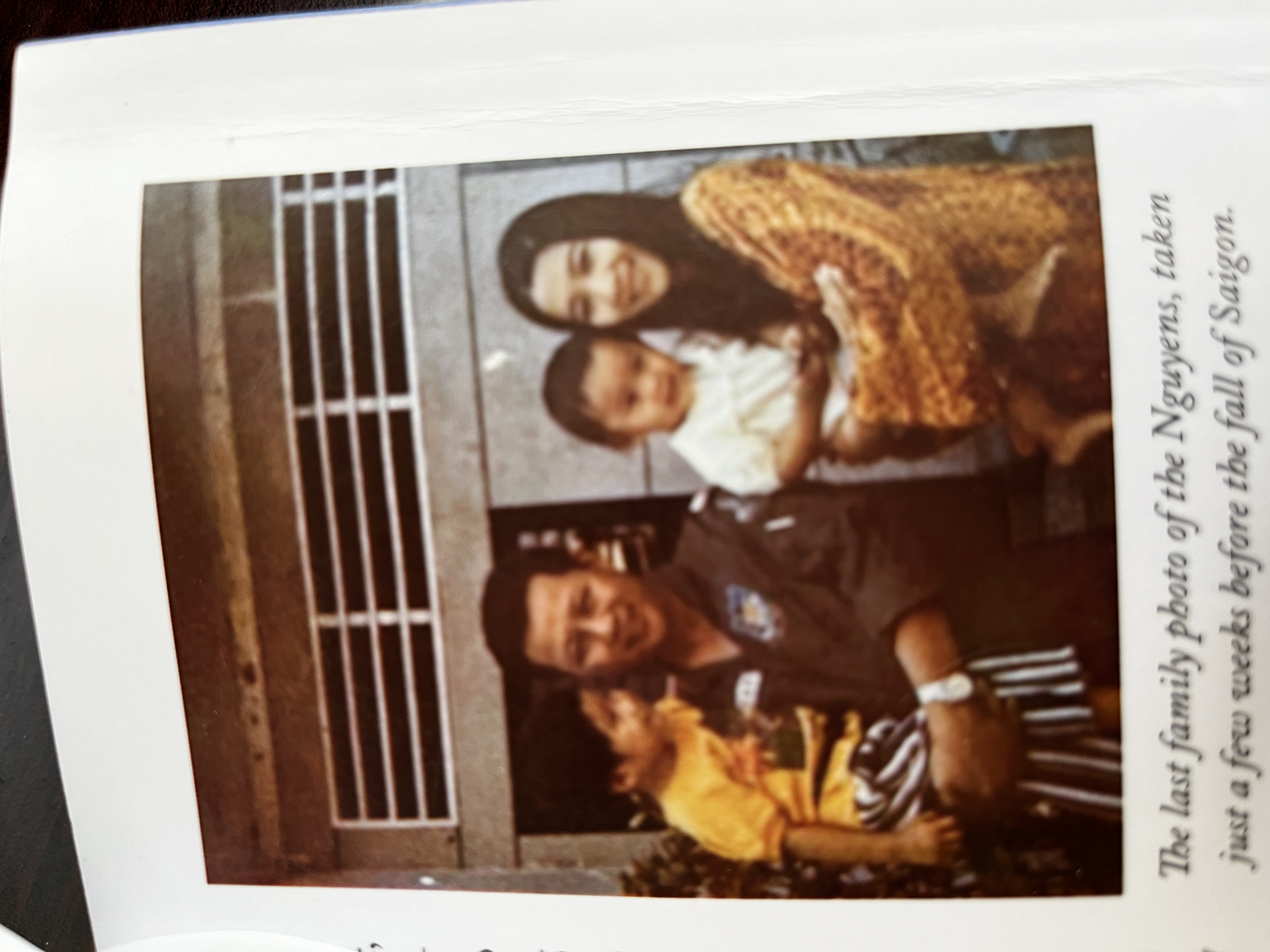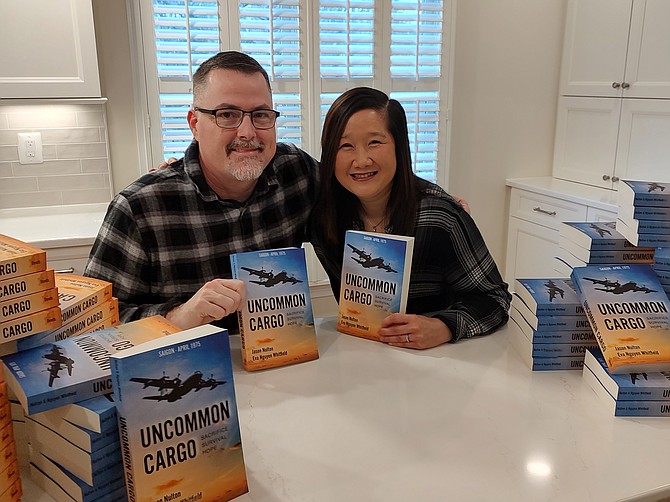Authors Jason Nulton and Eva Nguyen Whitfield hold their book, “Uncommon Cargo: Sacrifice. Survival. Hope.” (2023), Deeds Publishing Athens
Next spring, April 30, 2025, marks the 50th anniversary of the fall of Saigon. While there are photos and stories of the helicopter evacuations of the American diplomats and the South Vietnamese from the U.S. Embassy in Saigon on April 29, 1975, nothing has been told of what is considered to be the last plane to depart out of Saigon, a C-130. It left Tan Son Nhut Air Base before North Vietnamese forces breached the perimeter that afternoon.
 The last family photo of the Nguyens, taken a few weeks before the fall of Saigon
The last family photo of the Nguyens, taken a few weeks before the fall of Saigon
Reportedly missing its cargo door and holding hundreds of soon-to-be Vietnamese refugees squeezed in side by side to allow as many as possible to escape, among them is the Nguyen family, including Truc Nguyen, who is three years old. Her father, Chau Tan Nguyen, is going to fly his family and hundreds of others out of Saigon in the C-130. The plane begins taxiing. The co-pilot pulls back on the yoke. The nose of the C-130 pitches upward, sending him and his human cargo airborne on the afternoon of April 29. Rockets tear past the aircraft. The seat of pilot Chau Tan Nguyen, a 40-year-old lieutenant colonel and C-130 pilot in the South Vietnamese Air Force, is strikingly empty.
Truc would grow up to be Truc (Eva) Nguyen Whitfield, co-author of the newly published book, “Uncommon Cargo: Sacrifice. Survival. Hope.” (December 2023). Eva Nguyen Whitfield of Burke, Va., writes in the acknowledgments of the book, “I want to express our heartfelt thanks to this great country. There is no other like it. When my family was in our most desperate time of need, the United States of America and its citizens welcomed us as refugees and helped us rebuild our lives. We’re eternally grateful.”
Jason Nulton is a retired lieutenant colonel in the United States Air Force. Nulton co-authored “Uncommon Cargo" with Whitfield. The Nguyen families allowed Nulton to document their story of escape through interviews, access to photos, letters, scrapbooks, and more.
"When Eva first told me her story, I was stunned. We’d known each other for a couple years, yet up to that point, the subject of our extended families wasn’t something we talked much about. When I heard the against-all-odds story of her family’s escape from Saigon, I knew immediately it had to be heard,” Nulton said.
“Amongst the drama of the unfolding collapse, the gut-wrenching life and death decisions, and the ominous chaos of the time, the Nguyens beat the odds,” Nulton added. “Their experience is an incredible illustration of what real freedom means in a world where many seem to take it for granted. It is a true example of what humans achieve, even when challenged with nearly impossible odds."
The 452-page book is set in the historic days preceding Saigon's impending fall. It dramatizes the real-life plan of Chau Tan Nguyen, Whitfield's father, to evacuate his family by flying them and others out of Saigon in the C-130 and to safety. The book is referred to as historical fiction because it dramatizes actual events and features characters based on real people who are composites or created in the story to fill gaps.
In an interview on March 1, Whitfield said that Deeds Publishing specifically designed the book's cover to convey the essence of the story's setting and themes at a glance. The cover depicts a C-130 Hercules, an American four-engine turboprop military transport aircraft capable of operating from rough dirt strips. The military normally uses the C-130 to transport and drop troops and equipment in hostile areas.
"If you are in the military world or a pilot, they all recognize the plane. I love that the publisher paid attention to detail," Whitfield said.
The book's opening lines read, “April 29, 1975, Nguyen Home, Saigon, 1:45 p.m. ‘It has to be now, Mai,’ Chau tells his wife, the mother of their children, daughter Truc, 3, and son Trung, 18 months old. Mai, her parents, Hong and Dat, and her three younger brothers, Son, Dzung, and Tuan, all need to pack quickly for the flight.
“In March 1975, the North Vietnamese launched offensives in Quang Tri province, northern South Vietnam, where counterattacks were unsuccessful. A large number of troops desert to protect themselves and their families, frequently stripping off their uniforms and abandoning them on the road. On April 21, 1975, South Vietnam's President Nguyen Van Thieu resigned. He denounced the United States for betraying his country. In his resignation speech, he says, ‘You have let our soldiers die under the hail of shells … Refusing to aid an ally and abandon it is an inhuman act.’ By April 27, 100,000 North Vietnamese soldiers surrounded Saigon, and on April 29, they shelled Tan Son Nhut Air Base.”
The Nguyen family had been renting their unused home space to Americans for years. They assumed the men who occupied their space were CIA agents. They were in danger.
According to “Uncommon Cargo,” "When the communists took over South Vietnam in 1975, more than 60,000 people who had previously worked with or supported the American war effort were executed, and hundreds of thousands were sent to ‘re-education camps’ for months or years.”
Nulton says in the book’s acknowledgment that the Nguyens became legendary in his mind. In the U.S., veterans are revered as heroes who sacrificed for the cause of freedom and upheld the flag, the Constitution, and America's way of life. But Chau Nguyen went beyond that level of honor, becoming a veteran of something greater than a flag or a constitution. He fought for his failing country and died for the freedom of others.
"If not for Chau, his family and, indeed, many others may not have survived the collapse of South Vietnam. But instead, because of him, they have survived and thrived," writes Nulton in the book.
"Uncommon Cargo Sacrifice Survival Hope" is available online at Amazon, Barnes & Noble, and Books A Million. The 452-page book costs $29.95; the Kindle version is $4.99.
_______________________________________________________
What happened to the Nguyens?
[Source: “Uncommon Cargo”]
Chau Tan Nguyen died in Vietnam on April 29. When the family reached a refugee processing center in Thailand later that day, they only knew he wasn’t there. Several days passed before they were aware that he had been killed.
The Nguyen family settled in Northern Virginia. A cousin of the author’s mother, who was married to a Falls Church Presbyterian Church member, sponsored the family. For their first few years, they lived next door to the church in a house it owned. “I have really fond memories of living in the house that still stands today. I learned how to ride a bike in the church's parking lot.” Eva Nguyen Whitfield said.
Hong Van Nguyen, the patriarch of the family, stayed in Vietnam, trying to salvage his rubber plantation and business. By 1976, the government had seized it. Missing his family, he attempted to escape and became one of the first boat people. He washed up on the shores of Brunei and reunited with his family in 1977. Hong died in 1990.
Dat Thi Dang remained the respected matriarch of the family. With the plentiful resources of the church sponsors and non-profit assistance groups, she set her family up for success. She died in 2023 at age 96.
Nga Nguyen, Hong and Dat’s daughter, completed her studies abroad with a degree in dietetics after Saigon fell and “was hysterical after losing contact with her family." Months later, she communicated with her father and learned the family’s fate. She reconnected with them in 1978 in Virginia, received a master’s degree, and did clinical research at Johns Hopkins University for over two decades. She lives in Maryland.
Mai Nguyen, Hong and Dat’s other daughter, went to work at the World Bank a year after arriving in the U.S. She did not let the grief of Chau’s loss defeat her; instead, she focused on making their lives better in the new country. She lives in Northern Virginia.
Mai’s three brothers: Son (Sonny) Nguyen studied engineering, works for the federal government, and lives in Northern Virginia with his family; Dzung (Eric) Nguyen earned a degree in mechanical engineering, lives in Texas, and is married to a woman he met in Vietnam; and Tuan Nguyen holds a degree in computer information systems, earned a Master of Business Administration, and became a communications officer in the U.S. Marines. He lives in Maryland and works for the Department of Defense.
Mai and Chau’s daughter, Truc (Eva) Nguyen Whitfield, holds a bachelor’s degree in finance and marketing and lives in Northern Virginia with her husband and two sons. Mai and Chau’s son, Trung Nguyen, holds a bachelor’s degree in management information, works in cybersecurity, and lives with his two children in Northern Virginia.
